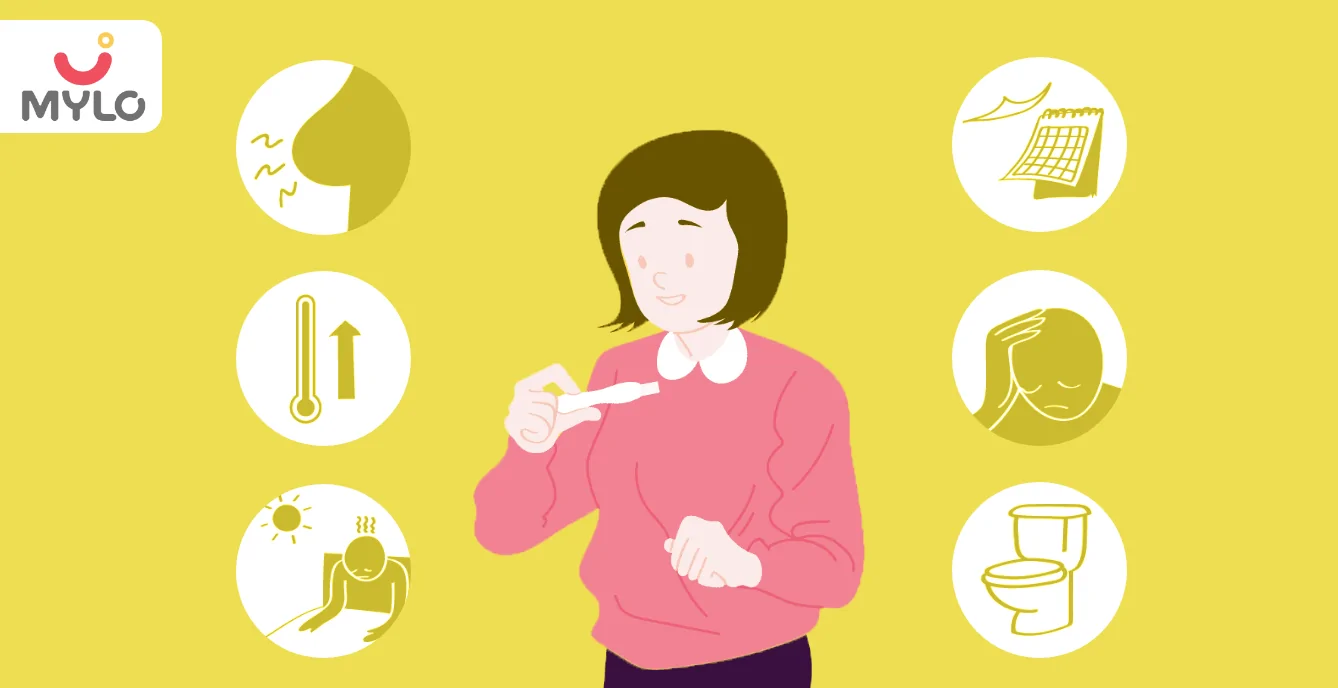Get MYLO APP
Install Mylo app Now and unlock new features
💰 Extra 20% OFF on 1st purchase
🥗 Get Diet Chart for your little one
📈 Track your baby’s growth
👩⚕️ Get daily tips

OR


Article Continues below advertisement
- Home

- Diet & Nutrition

- Chocolate During Breastfeeding: A Mom's Guide to Guilt-Free Indulgence
In this Article
- Can breastfeeding mother eat chocolate?
- How chocolate affects breast milk and baby?
- Benefits of consuming dark chocolate during breastfeeding
- 1. Antioxidants
- 2. Mood booster
- 3. Nutrient-rich
- 4. Energy boost
- 5. Stress relief
- Reasons to avoid eating chocolate during breastfeeding
- 1. Gastrointestinal issues
- 2. Weight management
- 3. Sugar content
- Precautions to follow while eating chocolate while breastfeeding
- 1. Moderation is key
- 2. Timing
- 3. Observe your baby
- 4. Opt for dark chocolate
- 5. Stay hydrated
- The Bottomline
- References
Diet & Nutrition
 229
229Chocolate During Breastfeeding: A Mom's Guide to Guilt-Free Indulgence
Updated on 20 December 2024
Breastfeeding is a beautiful and fulfilling experience for both the mother and the baby. However, it often comes with its fair share of questions and concerns, especially when it comes to the mother's diet. One common question that many breastfeeding mothers have is can I eat chocolate during breastfeeding? In this article, we will explore this dilemma of consuming chocolate during breastfeeding.
Can breastfeeding mother eat chocolate?
If you too are wondering, can I eat chocolate while breastfeeding, then you’d be happy to know that the answer is a resounding yes! Breastfeeding mothers can certainly enjoy chocolate, but there are a few things to consider. First and foremost, it is important to note that chocolate itself is not harmful to the baby. The main concern lies in the caffeine content found in chocolate.
Caffeine can potentially affect the baby's sleep patterns and cause irritability. It is recommended that breastfeeding mothers limit their caffeine intake to no more than 300 milligrams per day. Dark chocolate generally contains less caffeine than milk chocolate, making it a better choice for breastfeeding mothers.
Article continues below advertisment
How chocolate affects breast milk and baby?
One of the primary concerns with consuming chocolate while breastfeeding is its potential impact on breast milk and the baby. Chocolate contains a compound called theobromine, which is a stimulant similar to caffeine. When consumed in large quantities, theobromine can pass into breast milk and affect the baby's behavior. Some babies may become fussy, irritable, or have trouble sleeping if their mother consumes excessive amounts of chocolate.
It is important to note that every baby is different, and while some may be more sensitive to the effects of chocolate, others may not be affected at all. If you notice any changes in your baby's behavior after consuming chocolate, it may be a good idea to limit your intake or switch to dark chocolate, which contains less theobromine.
You may also like: From Crust to Cravings: Can Breastfeeding Mother Eat Pizza?
Benefits of consuming dark chocolate during breastfeeding
If you want to satisfy your sweet cravings and are wondering whether dark chocolate might be a better option, then here are five reasons why indulging in dark chocolate can be beneficial for breastfeeding mothers:
1. Antioxidants
Dark chocolate is rich in antioxidants that can help protect the body against free radicals and oxidative stress. This can boost overall health and support the immune system.
Article continues below advertisment
2. Mood booster
Dark chocolate contains compounds that can promote the release of endorphins, which are natural mood boosters. This can be particularly beneficial for mothers experiencing postpartum blues or mood swings.
3. Nutrient-rich
Dark chocolate contains essential nutrients such as iron, magnesium, and copper, which can help replenish nutrient stores in the mother's body.
4. Energy boost
The small amount of caffeine present in dark chocolate can provide a natural energy boost, helping breastfeeding mothers combat fatigue.
5. Stress relief
Breastfeeding can be physically and emotionally demanding. Dark chocolate can act as a stress reliever and provide a moment of relaxation and indulgence for the mother.
You may also like: Top 5 Foods A Breastfeeding Mother Should Eat
Article continues below advertisment
Reasons to avoid eating chocolate during breastfeeding
While chocolate can be enjoyed in moderation during breastfeeding, there are a few reasons why some mothers may choose to avoid it altogether. Here are five common reasons:
1. Gastrointestinal issues
Chocolate is known to be a common trigger for gastrointestinal problems, such as acid reflux and colic. If your baby is prone to these issues, it may be wise to avoid chocolate to prevent any discomfort.
2. Weight management
Chocolate is often high in calories and can contribute to weight gain if consumed in excess. If you are trying to manage your weight while breastfeeding, it may be beneficial to limit your chocolate intake.
3. Sugar content
Many chocolate products are loaded with sugar, which can lead to energy crashes and spikes in blood sugar levels. Opting for dark chocolate with a higher cocoa percentage can help reduce the sugar content.
You may also like: Breastfeeding Through Illness: Tips for Nursing Mothers While Sick
Article continues below advertisment
Precautions to follow while eating chocolate while breastfeeding
If you decide to indulge in chocolate during breastfeeding, it is important to do so in a responsible and cautious manner. Here are five precautions to follow:
1. Moderation is key
As with any food or beverage, moderation is key. Enjoy chocolate in small quantities and avoid excessive consumption.
2. Timing
Some babies may be more sensitive to the effects of chocolate than others. Consider eating chocolate after a feeding session to allow ample time for any potential effects to wear off before the next feeding.
3. Observe your baby
Pay close attention to your baby's behavior after consuming chocolate. If you notice any changes, such as increased fussiness or difficulty sleeping, it may be a sign that your baby is sensitive to the compounds in chocolate. Adjust your intake accordingly.
4. Opt for dark chocolate
Dark chocolate contains less caffeine than milk chocolate and is often a healthier choice. Look for dark chocolate with a high cocoa percentage to minimize the effects on your baby.
Article continues below advertisment
5. Stay hydrated
Chocolate, especially dark chocolate, can be slightly dehydrating. Make sure to drink plenty of water to stay hydrated and ensure a healthy milk supply.
The Bottomline
In conclusion, breastfeeding mothers can enjoy chocolate in moderation without feeling guilty. While there are precautions to consider, such as limiting caffeine intake and observing the baby's behavior, indulging in a piece of dark chocolate can provide various benefits. Remember to listen to your body, pay attention to your baby's cues, and make informed choices that align with your personal preferences and dietary needs. So go ahead, savor that guilt-free indulgence and enjoy the sweet moments of motherhood.
References
1. Drugs and Lactation Database (LactMed®) [Internet]. (2022). Bethesda (MD): National Institute of Child Health and Human Development
2. Jeong G, Park SW, Lee YK, Ko SY, Shin SM. (2017). Maternal food restrictions during breastfeeding. Korean J Pediatr.
Article continues below advertisment



Written by
Anupama Chadha
Anupama Chadha, born and raised in Delhi is a content writer who has written extensively for industries such as HR, Healthcare, Finance, Retail and Tech.
Read MoreGet baby's diet chart, and growth tips

Related Articles
How Respiratory Syncytial Virus (RSV) Impacts Premature Babies Differently: What Every Parent Needs To Know
Adverbs: A Comprehensive Guide to help small children learn the usage of adverbs
Expand Your Child's Vocabulary with words that start with X: Easy, Positive, and Engaging Words, Animals, Countries, and Fruits
Unlocking Language Proficiency: The Ultimate Guide to Top 100 Sight Words for Kindergarten and Beyond
Related Questions
Hello frnds..still no pain...doctor said head fix nhi hua hai..bt vagina me pain hai aur back pain bhi... anyone having same issues??
734 views
Kon kon c chije aisi hai jo pregnancy mei gas acidity jalan karti hain... Koi btayega plz bcz mujhe aksar khane ke baad hi samagh aata hai ki is chij se gas acidity jalan ho gyi hai. Please share your knowledge
733 views
I am 13 week pregnancy. Anyone having Storione-xt tablet. It better to have morning or night ???
732 views
Hlo to be moms....i hv a query...in my 9.5 wk i feel body joint pain like in ankle, knee, wrist, shoulder, toes....pain intensity is high...i cnt sleep....what should i do pls help....cn i cosult my doc.
736 views
Influenza and boostrix injection kisiko laga hai kya 8 month pregnancy me and q lagta hai ye plz reply me
752 views
RECENTLY PUBLISHED ARTICLES
our most recent articles

Growth & Development
Preventing Respiratory Syncytial Virus (RSV) In Preemies: Essential Steps For New Parents
(8,477 Views)

Growth & Development
How Respiratory Syncytial Virus (RSV) Impacts Premature Babies Differently: What Every Parent Needs To Know
(27,936 Views)

Health & Wellness
Unlocking the Hidden Potential: 8 Incredible Shatavari Powder Uses for Men and Women
(2,037 Views)

Hormones
Are You Aware of These 11 Early Signs and Symptoms of Pregnancy?
(56,450 Views)

General Father
Top 5 tips to build a budget-friendly nursery for your little one
(8,904 Views)

Teething
Toddler Teething: What to Expect and How to Help
(10,462 Views)
- Adverbs: A Comprehensive Guide to help small children learn the usage of adverbs
- Expand Your Child's Vocabulary with words that start with X: Easy, Positive, and Engaging Words, Animals, Countries, and Fruits
- Unlocking Language Proficiency: The Ultimate Guide to Top 100 Sight Words for Kindergarten and Beyond
- Exploring Common Words that Start with P to Enhance Vocabulary in Small Children
- 100+ Common Words that start with L to Enhance the Vocabulary of Small Children
- 100 Common Words that start with 'C' for Small Children
- List of 100+ Common Words that start with 'D' for Small Children
- Top 100 Baby Girl Names 2024
- The Ultimate Collection of Muslim Baby Girl Names and Their Meanings 2024.
- Top 100 Baby Boy Names 2024
- 100+ Collection of Baby Boy Names Hindu and Their Meanings 2024
- The Ultimate Collection of Baby Girl Names Indian 2024
- 100 Common Words that start with 'S' for enhancing vocabulary in small children
- List of Most Common Words that start with v for small children


AWARDS AND RECOGNITION
Mylo wins Forbes D2C Disruptor award
Mylo wins The Economic Times Promising Brands 2022
AS SEEN IN
















At Mylo, we help young parents raise happy and healthy families with our innovative new-age solutions:
- Mylo Care: Effective and science-backed personal care and wellness solutions for a joyful you.
- Mylo Baby: Science-backed, gentle and effective personal care & hygiene range for your little one.
- Mylo Community: Trusted and empathetic community of 10mn+ parents and experts.
Product Categories
baby carrier | baby soap | baby wipes | stretch marks cream | baby cream | baby shampoo | baby massage oil | baby hair oil | stretch marks oil | baby body wash | baby powder | baby lotion | diaper rash cream | newborn diapers | teether | baby kajal | baby diapers | cloth diapers |










